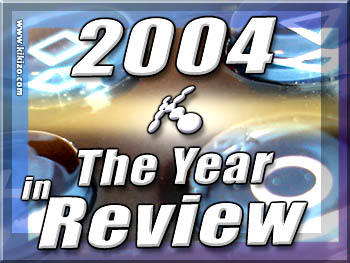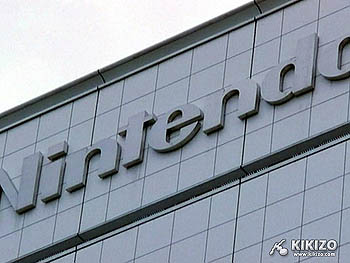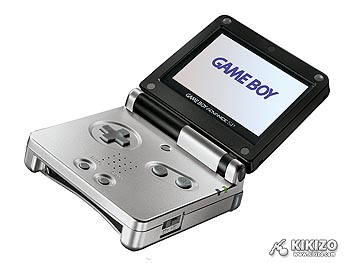2004: The Year in Review, Part 1
This year has been one of the biggest the industry has ever seen. Kikizo takes a look back at the year that was in a four-part special, starting with the first quarter of 2004.
Yes indeed, it has been a very exciting year for gamers. Not only did 2004 see the release of some of the most successful games of all time, but Nintendo and Sony both released new handhelds, ushering in the next generation of video games.

Handheld Hysteria Begins
Coming off a record-setting year in 2003, during which video games brought in £1.3billion in the UK alone, the opening months of 2004 set the stage for an even bigger year. Just seven months after officially announcing the PSP last year's E3, Sony Europe's Chris Deering said at the start of 2004 that gamers would be able to pick up the handheld in November. Part of the reason Sony was so eager to release the PSP before the end of the year was that the PlayStation would be celebrating its 10th birthday in early December.
 After its announcement and concept model unveiling during 2003, this year started as it ended: with major PSP excitement
After its announcement and concept model unveiling during 2003, this year started as it ended: with major PSP excitementAside from the impressive spec sheet and the promotional shots of the hardware concept models (which Kikizo was the first games site to publish), people still had no idea of crucial aspects of the PSP, like how long the battery would last, or how closely the games would ape those on PlayStation 2.
DS Uncovered
Of course, the PSP wasn't the only new portable set for release in 2004, and in early January Nintendo announced it would be releasing the Nintendo DS (this wouldn't become the official name until later in the year). The clamshell console would have two processors and two screens, one of which was touch-sensitive. A lot of people weren't convinced by the company's new direction, and some even suggested that the Nintendo DS was the company's quick-fix response to the PSP.
 Despite January's DS announcement, details remained sketchy,
Despite January's DS announcement, details remained sketchy,but anticipation would reach fever pitch before the year's end
Nintendo was adamant that the Nintendo DS would be a third platform for the company, and representatives said that the company was already working on the successors to both the Game Boy Advance and the GameCube. Although the new gameplay possibilities of the DS's unique hardware features proved tantalising, further solid details on the DS wouldn't surface until May's E3.
Sin City, Tokyo or San Andreas?
It was also in January that Rockstar's parent company Take 2 registered several names at the US Patents Office for its forthcoming Grand Theft Auto title, a project it had announced in late 2003. Shortly after Amazon listed Grand Theft Auto IV: Sin City on its site, Rockstar registered GTA: San Andreas as well as GTA: Bogota, GTA: Tokyo and GTA: Sin City, sowing confusion for would-be prognosticators.
The official San Andreas announcement came at the start of March, confirming the title as San Andreas. The Grand Theft Auto series was also in the news for political reasons, as US presidential hopeful Joseph Lieberman pounced on the series' less family friendly possibilities, calling the series "horrendous".
Rumbles in Redmond
At Microsoft, things were on the up and up. The company announced in January that it had taken over second place in the hardware standing behind Sony, sending Nintendo to the back of the line. It was also announced that gamers were also able to pick up the Crystal Xbox for the first time, much to the dismay of aesthetes in North America.
While no one in Microsoft had gone into detail about the successor to the Xbox - or Xbox Next, as most media outlets had started referring to it - company representatives in Japan did say that it would be smaller. Worryingly, the first rumours that Xbox 2 would lack a hard drive also surfaced. An Israeli company said that it would be making flash drives for Xbox 2 that would take the place of the hard drive.
Inexplicably, somebody from Nintendo's Japanese headquarters started making noises about a Sega-style hardware exit, resulting in an awful day for Nintendo PR teams - which were quick to blame the Japanese publication in question for the quote, while hopefully sacking whoever was actually responsible behind the scenes.
Back in January meanwhile, the departure of Ed Fries from the Xbox camp shocked some of the industry, ald the reasons behind his decision to leave remain pretty mysterious to this day.
First Next-Gen Shot Fired
It was at March's Game Developer Conference in San Jose, California, that things really started hotting up, though. Microsoft showed off its XNA platform for the first time, which would provide developers with a software middle ground for creating games for the next generation of PCs and consoles more easily. The next generation of hardware would be exponentially more powerful than the current, it was explained, and this means that making games will require bigger teams of creators and longer incubation times.
The best parts of Microsoft's presentation, though, were the tech demos that showed off what was possible with the XNA platform. While none of the demos were actual games, Microsoft had clearly set the stage for a battle of beauty much like that which has preceded every new hardware generation. The show was also the site for the first public showing of software for Sony's PSP in the form of cartoon-like action game Death Jr, though this would soon by eclipsed by more high profile games at May's E3 conference.
The Year of the Papers
In the UK, games made the papers a few times during the winter. In February, Eidos' Whiplash caused a fuss when the RSPCA called the game's depiction of research laboratory animals irresponsible. Even MPs and the police got involved. The problem was that the game took a biased look at the treatment of research animals, which the police and MPs said was too one-sided for impressionable children. It wasn't all bad, though. The Trade & Investment Organisation said early in the year that video games should be given a higher priority. The group worked together with the Entertainment & Leisure Software Publishers Association (ELSPA) and The Independent Game Association (TIGA) on a plan to increase the profile abroad of the domestic video game scene.
The first quarter of 2004 also contained some offbeat stories, not all of them funny, like the report of a child in the US who was arrested in February after he brought a modified Game Boy to school that had been turned into a bomb. Gamers with cash lying around were finally able to buy the perfect Halloween costume. At $3,500, the replica of Halo lead character Master Chief's Mjolnir armour wasn't cheap, but it was good enough to cause a certain sect of people to adopt a suitable shade of jade. The award for tenacity, though, has to go out to Bill Carlton. The American made a run at the long-standing world record for the arcade game Asteroids. After playing for more than 27 hours, the machine died on Carlton, leaving him far short of the world record, but making him a minor celebrity none the less - at least for a short while.
Spring's Crescendo
But as exciting and entertaining as the first few months of 2004 were, it was during the spring that the industry began its annual crescendo. Come back for the next part, as we look back at the rest of 2004's first half.
- Part 1: Winter 2004
- Part 2: Spring 2004
- Part 3: Summer 2004
- Part 4: Autumn 2004
Continue to Rest of Feature:










 Satoru Iwata Video Interview - the late Nintendo president spoke with Kikizo in 2004 as 'Nintendo Revolution' loomed.
Satoru Iwata Video Interview - the late Nintendo president spoke with Kikizo in 2004 as 'Nintendo Revolution' loomed. Kaz Hirai Video Interview - the first of Kikizo's interviews with the man who went on to become global head of Sony.
Kaz Hirai Video Interview - the first of Kikizo's interviews with the man who went on to become global head of Sony. Ed Fries Video Interview - one of Xbox's founders discusses an epic journey from Excel to Xbox.
Ed Fries Video Interview - one of Xbox's founders discusses an epic journey from Excel to Xbox. Yu Suzuki, the Kikizo Interview - we spend time with one of gaming's most revered creators.
Yu Suzuki, the Kikizo Interview - we spend time with one of gaming's most revered creators. Tetris - The Making of an Icon: Alexey Pajitnov and Henk Rogers reveal the fascinating story behind Tetris
Tetris - The Making of an Icon: Alexey Pajitnov and Henk Rogers reveal the fascinating story behind Tetris Rare founders, Chris and Tim Stamper - their only interview? Genuinely 'rare' sit down with founders of the legendary studio.
Rare founders, Chris and Tim Stamper - their only interview? Genuinely 'rare' sit down with founders of the legendary studio. The History of First-Person Shooters - a retrospective, from Maze War to Modern Warfare
The History of First-Person Shooters - a retrospective, from Maze War to Modern Warfare